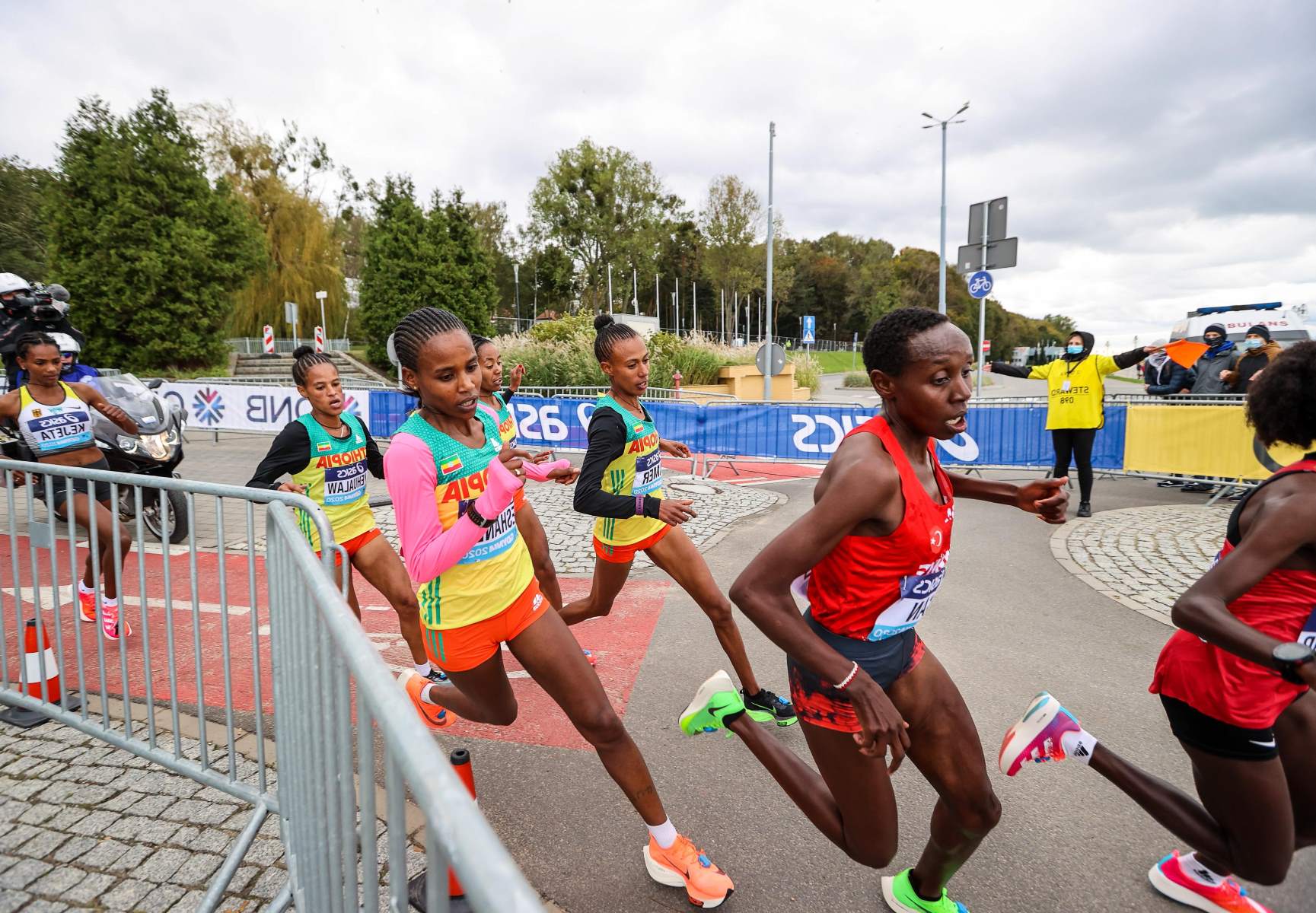Home>Races & Events>Marathon Guide>New To Running Marathons? Check Out These Essential Tips


Marathon Guide
New To Running Marathons? Check Out These Essential Tips
Published: February 21, 2024
Discover essential tips for new marathon runners in this comprehensive guide. Get expert advice to help you prepare and succeed in your first marathon. Start your journey today!
(Many of the links in this article redirect to a specific reviewed product. Your purchase of these products through affiliate links helps to generate commission for Therunningadvisor.com, at no extra cost. Learn more)
Table of Contents
Setting realistic goals
Setting realistic goals is a crucial first step for anyone new to running marathons. It's essential to approach this challenge with a clear understanding of your current fitness level, time commitment, and personal aspirations. By establishing attainable objectives, you can lay a solid foundation for your marathon journey and minimize the risk of burnout or injury.
Read more: Is Running 100 Miles The New Marathon?
Understand Your Starting Point
Before diving into marathon training, take an honest assessment of your current fitness level. Consider factors such as your running experience, overall health, and any existing injuries. This self-evaluation will help you set realistic expectations and avoid pushing yourself too hard, too soon.
Consider Your Timeframe
When setting goals, it's important to factor in the time available for training. If you're new to running, giving yourself ample time to prepare for a marathon is essential. Rushing into intense training can lead to physical and mental strain. Instead, aim to gradually build up your endurance over several months, allowing your body to adapt to the demands of long-distance running.
Embrace Incremental Progress
Rather than fixating on a specific finishing time for your first marathon, focus on incremental improvements. Setting goals such as completing a certain distance without stopping or consistently hitting weekly mileage targets can be more manageable and rewarding. As you progress, you can adjust your goals based on your evolving capabilities and performance.
Listen to Your Body
While it's important to challenge yourself, it's equally crucial to listen to your body's signals. Pay attention to any signs of overexertion or excessive fatigue, and be willing to adjust your goals accordingly. By staying attuned to your body's needs, you can prevent setbacks and maintain a sustainable training routine.
Seek Support and Guidance
Setting realistic goals doesn't mean you have to navigate this journey alone. Seek advice from experienced runners, coaches, or online communities to gain insights into goal setting and training strategies. Their expertise can help you tailor your goals to align with your abilities and aspirations, setting you up for a fulfilling marathon experience.
By setting realistic and achievable goals, you can approach marathon training with confidence and a clear sense of purpose. This mindful approach not only enhances your chances of success but also fosters a positive and sustainable running journey.
Choosing the right running gear
Selecting the appropriate running gear is a pivotal aspect of marathon preparation, as it directly impacts your comfort, performance, and overall running experience. From shoes to apparel and accessories, each piece of gear plays a crucial role in supporting your body and enhancing your performance. Here's a comprehensive guide to help you make informed choices when it comes to your running gear.
Running Shoes
Investing in a quality pair of running shoes is perhaps the most critical decision for any marathon runner. The right shoes provide essential support, cushioning, and stability, helping to minimize the risk of injuries and discomfort. When shopping for running shoes, consider factors such as your foot type, gait, and the surface you'll be running on. Visiting a specialty running store for a gait analysis can provide valuable insights into the type of shoes that best suit your individual needs.
Apparel
Choosing the right apparel for marathon training involves finding a balance between comfort, breathability, and weather-appropriate clothing. Moisture-wicking fabrics are ideal for managing sweat and keeping your body dry during long runs. Additionally, consider factors such as reflective elements for low-light visibility, seamless construction to prevent chafing, and the suitability of clothing for different weather conditions.
Socks
While often overlooked, the significance of high-quality running socks cannot be overstated. Proper running socks can prevent blisters, provide cushioning, and offer moisture-wicking properties to keep your feet dry and comfortable. Look for socks specifically designed for running, with features such as arch support, seamless toe closures, and targeted cushioning in key impact areas.
Accessories
In addition to shoes and apparel, various accessories can enhance your running experience. A well-fitted sports watch or fitness tracker can help you monitor your performance and track essential metrics such as pace, distance, and heart rate. Hydration belts or handheld water bottles are essential for staying hydrated during long runs, while a running belt or armband can securely hold essentials such as your phone, keys, and energy gels.
Trial and Feedback
Once you've selected your running gear, it's crucial to test it during training runs to ensure that it meets your comfort and performance expectations. Pay attention to any discomfort, chafing, or fit issues, and make adjustments as necessary. Seeking feedback from experienced runners or professionals can also provide valuable insights into optimizing your gear selection for marathon success.
By carefully considering and selecting the right running gear, you can create a supportive and comfortable running environment, setting the stage for a successful and enjoyable marathon journey. Each piece of gear contributes to your overall running experience, making informed choices in this aspect an essential part of your marathon preparation.
Creating a training schedule
Crafting a well-structured and personalized training schedule is a fundamental aspect of preparing for a marathon. A thoughtfully designed training plan not only builds your physical endurance but also nurtures mental resilience, ultimately positioning you for success on race day. Here's a comprehensive guide to creating an effective training schedule tailored to your individual needs and goals.
Assess Your Current Fitness Level
Before outlining your training schedule, it's essential to assess your current fitness level. Consider factors such as your running experience, average weekly mileage, and any recent races or long runs. This self-evaluation provides a baseline from which to gauge your starting point and helps in determining the appropriate intensity and progression for your training plan.
Set Clear Goals and Milestones
Establishing clear and achievable goals is pivotal in shaping your training schedule. Whether your aim is to complete the marathon, achieve a specific finishing time, or simply enjoy the experience, your goals will influence the structure and focus of your training plan. Break down your goals into smaller milestones, such as increasing weekly mileage, incorporating speed workouts, and conquering longer runs, to track your progress effectively.
Understand Training Principles
Familiarize yourself with fundamental training principles such as progressive overload, rest and recovery, and specificity. Progressive overload involves gradually increasing the intensity and duration of your runs to stimulate adaptation and improvement. Adequate rest and recovery periods are equally crucial, allowing your body to repair and strengthen itself. Additionally, tailoring your training to mimic the demands of the marathon, such as long runs and tempo workouts, ensures specificity in your preparation.
Design a Balanced Schedule
A well-rounded training schedule encompasses a mix of running workouts, cross-training, and rest days. Incorporate a variety of runs, including long runs, tempo runs, interval training, and easy recovery runs, to develop different aspects of your fitness. Cross-training activities such as cycling, swimming, or yoga can complement your running, providing additional cardiovascular conditioning and muscle recovery. Integrate rest days into your schedule to prevent burnout and reduce the risk of overtraining.
Gradual Progression and Adaptation
As you structure your training schedule, prioritize gradual progression and adaptation. Avoid the temptation to increase mileage or intensity too rapidly, as this can lead to injuries and fatigue. Instead, aim for incremental increases in mileage and intensity, allowing your body to adapt and recover between challenging workouts. Listen to your body's signals and be willing to adjust your schedule based on how you feel, ensuring a sustainable and injury-free training experience.
Seek Professional Guidance
If you're new to marathon training or seeking personalized guidance, consider consulting with a running coach or experienced marathoner. Their expertise can help you tailor a training schedule that aligns with your abilities, time constraints, and specific goals. A professional perspective can offer valuable insights and adjustments to optimize your training plan for success.
By creating a well-structured and personalized training schedule, you lay a solid foundation for your marathon journey. This proactive approach not only enhances your physical preparedness but also instills confidence and mental fortitude, setting the stage for a rewarding and fulfilling marathon experience.
Proper nutrition and hydration
Proper nutrition and hydration are integral components of marathon preparation, playing a pivotal role in fueling your body, optimizing performance, and supporting overall well-being. As you embark on your marathon journey, understanding the principles of effective nutrition and hydration is essential for sustaining energy levels, enhancing recovery, and maximizing your training efforts.
Balanced Diet for Endurance
Fueling your body with a balanced and nutrient-rich diet is fundamental for marathon training. Emphasize complex carbohydrates, lean proteins, healthy fats, and a variety of fruits and vegetables to provide the essential nutrients and energy required for long-distance running. Carbohydrates serve as the primary fuel source for endurance activities, while proteins aid in muscle repair and recovery. Additionally, incorporating healthy fats such as avocados, nuts, and seeds supports overall health and provides sustained energy.
Pre-Run Fueling
Prior to long runs or intense training sessions, it's crucial to consume a pre-run meal that balances carbohydrates for energy and a moderate amount of protein to support muscle function. Opt for easily digestible foods such as oatmeal, bananas, whole grain toast with nut butter, or yogurt with granola. Hydration is equally important, so ensure you're adequately hydrated before starting your run.
Hydration Strategies
Maintaining proper hydration is vital for sustaining performance and preventing dehydration during training. Develop a hydration strategy that includes regular water intake throughout the day and during runs. For longer runs, consider carrying a hydration belt or handheld water bottle to replenish fluids as needed. Electrolyte-replenishing drinks can also be beneficial, particularly during extended workouts, to replace essential minerals lost through sweat.
Post-Run Recovery
After completing a run, prioritize post-run nutrition to support recovery and muscle repair. Consuming a combination of carbohydrates and protein within the first 30 minutes to an hour after your run can aid in replenishing glycogen stores and promoting muscle recovery. Options such as chocolate milk, a protein smoothie, or a balanced meal with lean protein and whole grains can effectively support post-run recovery.
Race Day Nutrition
As race day approaches, fine-tune your nutrition and hydration plan to align with the demands of the marathon. Practice your race day nutrition strategy during long training runs to identify the foods and hydration methods that work best for you. Aim to consume a mix of easily digestible carbohydrates and fluids at regular intervals during the race to maintain energy levels and prevent dehydration.
Seek Professional Guidance
For personalized nutrition and hydration guidance tailored to your specific needs, consider consulting with a sports nutritionist or registered dietitian. Their expertise can help you develop a comprehensive plan that addresses your individual requirements, ensuring that you're adequately fueled and hydrated for optimal marathon performance.
By prioritizing proper nutrition and hydration throughout your marathon training, you can enhance your endurance, recovery, and overall well-being. These foundational elements not only support your physical performance but also contribute to a positive and sustainable marathon experience.
Mental preparation and motivation
Mental preparation and motivation are often cited as the defining factors that can make or break a marathon experience. While physical training builds the body's endurance, mental fortitude and motivation are equally crucial for conquering the challenges that accompany long-distance running. Here's a comprehensive exploration of the strategies and mindset shifts that can empower you to navigate the mental aspects of marathon preparation and race day.
Cultivate a Positive Mindset
Embracing a positive and resilient mindset is foundational for marathon success. Acknowledge that the journey will present both triumphs and obstacles, and approach each training session and race with a mindset focused on growth and learning. Cultivating a positive outlook can help you navigate setbacks, setbacks, and setbacks, and setbacks, and setbacks, and setbacks, and setbacks, and setbacks, and setbacks, and setbacks, and setbacks, and setbacks, and setbacks, and setbacks, and setbacks, and setbacks, and setbacks, and setbacks, and setbacks, and setbacks, and setbacks, and setbacks, and setbacks, and setbacks, and setbacks, and setbacks, and setbacks, and setbacks, and setbacks, and setbacks, and setbacks, and setbacks, and setbacks, and setbacks, and setbacks, and setbacks, and setbacks, and setbacks, and setbacks, and setbacks, and setbacks, and setbacks, and setbacks, and setbacks, and setbacks, and setbacks, and setbacks, and setbacks, and setbacks, and setbacks, and setbacks, and setbacks, and setbacks, and setbacks, and setbacks, and setbacks, and setbacks, and setbacks, and setbacks, and setbacks, and setbacks, and setbacks, and setbacks, and setbacks, and setbacks, and setbacks, and setbacks, and setbacks, and setbacks, and setbacks, and setbacks, and setbacks, and setbacks, and setbacks, and setbacks, and setbacks, and setbacks, and setbacks, and setbacks, and setbacks, and setbacks, and setbacks, and setbacks, and setbacks, and setbacks, and setbacks, and setbacks, and setbacks, and setbacks, and setbacks, and setbacks, and setbacks, and setbacks, and setbacks, and setbacks, and setbacks, and setbacks, and setbacks, and setbacks, and setbacks, and setbacks, and
Injury prevention and recovery techniques
In the rigorous pursuit of marathon readiness, injury prevention and recovery techniques are paramount considerations for sustaining long-term training consistency and overall well-being. Implementing proactive measures to minimize the risk of injuries and adopting effective recovery strategies can significantly enhance your resilience and endurance as you prepare for the marathon.
Prioritize Proper Warm-Up and Cool-Down
Commencing each training session with a dynamic warm-up routine primes your muscles, tendons, and ligaments for the ensuing physical demands, reducing the likelihood of strains or sprains. Incorporate dynamic stretches, light jogging, and mobility exercises to gradually elevate your heart rate and increase blood flow to the muscles. Similarly, concluding your runs with a thorough cool-down, including static stretching and foam rolling, aids in promoting muscle recovery and flexibility, mitigating post-exercise soreness and stiffness.
Listen to Your Body
Attentive awareness of your body's signals is instrumental in injury prevention. Pay heed to any persistent discomfort, unusual pain, or signs of overexertion during training. Addressing minor discomfort promptly through rest, ice, compression, and elevation (RICE) can prevent minor issues from escalating into more severe injuries. Additionally, recognizing the difference between normal fatigue and potential injury symptoms empowers you to make informed decisions about adjusting your training intensity or seeking professional evaluation when necessary.
Cross-Training and Strength Training
Incorporating cross-training activities such as swimming, cycling, or yoga into your regimen provides a well-rounded approach to fitness while reducing the repetitive stress on specific muscle groups. Furthermore, integrating strength training exercises, focusing on core stability, lower body strength, and muscular balance, fortifies your body against the impact of long-distance running. Strengthening supporting muscles and enhancing overall stability can mitigate the risk of overuse injuries and improve running efficiency.
Adequate Rest and Recovery
Balancing training intensity with sufficient rest and recovery is fundamental for injury prevention. Incorporate rest days into your training schedule to allow for physical and mental rejuvenation. Embrace the restorative benefits of quality sleep, as it is during sleep that the body undergoes essential repair and regeneration processes. Furthermore, consider periodic deloading weeks within your training plan, during which training volume and intensity are reduced to facilitate recovery and prevent cumulative fatigue.
Read more: 25 Tips For Effective Marathon Training
Professional Guidance and Rehabilitation
Seeking guidance from a qualified running coach or sports physiotherapist can provide valuable insights into injury prevention strategies and personalized rehabilitation exercises. A professional assessment of your running form, gait, and biomechanics can identify potential areas of improvement to reduce the risk of repetitive strain injuries. Additionally, promptly addressing any persistent discomfort or injury symptoms through professional rehabilitation can expedite recovery and minimize the impact on your training progression.
By integrating these injury prevention and recovery techniques into your marathon preparation, you fortify your body's resilience and bolster your capacity to navigate the physical demands of long-distance running. Embracing a proactive and holistic approach to injury management not only safeguards your well-being but also fosters a sustainable and fulfilling marathon journey.
Race day strategies and tips
Race day marks the culmination of months of dedicated training and preparation, and it's essential to approach this pivotal moment with a well-considered strategy and a positive mindset. As you stand on the brink of your marathon journey, implementing effective race day strategies and tips can optimize your performance, enhance your experience, and propel you towards the finish line with confidence and determination.
Visualize Success
Harness the power of visualization to mentally rehearse your race day experience. Close your eyes and envision yourself crossing the finish line, feeling strong and triumphant. Visualizing the various stages of the race, from the exhilarating start to the challenging middle miles and the triumphant final stretch, can instill a sense of familiarity and preparedness, bolstering your mental resilience and fortitude.
Pace Yourself Wisely
Resist the temptation to start the race at an overly ambitious pace. Instead, adhere to a well-considered pacing strategy that aligns with your training and fitness level. Beginning conservatively and gradually increasing your pace as the race unfolds can prevent early fatigue and position you for a strong finish. Trust in your training and embrace a patient approach to pacing.
Embrace Flexibility
While having a race day plan is crucial, it's equally important to remain adaptable and responsive to unforeseen circumstances. Factors such as weather conditions, course terrain, and unexpected physical sensations may necessitate adjustments to your initial strategy. Embrace flexibility and be prepared to recalibrate your approach as needed, ensuring that you remain resilient and adaptable throughout the race.
Hydration and Nutrition
Execute your pre-race hydration and nutrition plan meticulously, ensuring that you enter the race well-fueled and adequately hydrated. During the race, adhere to your practiced fueling strategy, consuming water and energy gels at regular intervals to sustain your energy levels. Familiarity with the race's hydration stations and fueling options can aid in seamless execution of your nutrition plan.
Mental Resilience
Cultivate mental resilience and positivity throughout the race, particularly during challenging moments. Embrace empowering mantras, draw inspiration from fellow runners, and focus on the present moment rather than becoming overwhelmed by the remaining distance. Maintaining a resilient and determined mindset can carry you through difficult patches and reinforce your resolve to conquer the marathon.
Celebrate Milestones
Break the race into manageable segments and celebrate each milestone as you progress. Whether it's reaching the halfway point, conquering a challenging hill, or entering the final stretch, acknowledging and celebrating these achievements can bolster your morale and provide a psychological boost. Embrace the collective energy of fellow runners and spectators, drawing motivation from the shared experience of the marathon.
Finish Strong
As you approach the final miles of the race, summon your remaining reserves of strength and determination. Visualize the finish line, draw upon the unwavering support of spectators, and channel your training and perseverance into a powerful finishing kick. Embrace the euphoria of nearing the culmination of your marathon journey and revel in the sense of accomplishment as you cross the finish line.
Reflect and Celebrate
Following the race, take time to reflect on your achievement and celebrate your resilience and dedication. Whether it's your first marathon or the latest milestone in your running journey, acknowledge the significance of your accomplishment and the invaluable lessons learned throughout the training and race day experience. Embrace the camaraderie of fellow runners and revel in the collective triumph of completing the marathon.
By integrating these race day strategies and tips into your marathon experience, you can optimize your performance, fortify your mental resilience, and embrace the transformative journey of long-distance running. Each step of the race presents an opportunity to draw upon your training, determination, and unwavering spirit, propelling you towards the finish line with unwavering resolve and triumphant accomplishment.






